I need to update values in web.config in Azure TFS. I am able to get the value for connectionString replaced which is part of the appSettings (for this to work, I needed to enable the setting named XML variable substitution (under IIS Web Deploy).
However, there are other areas within web.config which do not get replaced.
I have tried several different approaches, using different tasks for token replacement, using the "Release" or "Environment" setting for variables, using variable groups. However, none of these worked.
Currently I am using the Replace tokens task (available at https://github.com/qetza/vsts-replacetokens-task#readme )
I have set the Token Prefix and Suffix to __ (to match with what is web.config)
Here is an extract of the web.config file
<?xml version="1.0"?>
<configuration>
<appSettings>
<add key="ConnectionString" value="__ConnectionString__"/>
</appSettings>
<system.web>
<pages theme="__Theme__" controlRenderingCompatibilityVersion="3.5" clientIDMode="AutoID">
<controls>
<add tagPrefix="asp" namespace="System.Web.UI" assembly="System.Web.Extensions, Version=1.0.61025.0, Culture=neutral, PublicKeyToken=31bf3856ad364e35"/>
</controls>
</pages>
</system.web>
<system.serviceModel>
<serviceHostingEnvironment multipleSiteBindingsEnabled="true"/>
<bindings>
<customBinding>
<binding name="TestBinding1">
<textMessageEncoding maxReadPoolSize="64" maxWritePoolSize="16" messageVersion="Soap12" writeEncoding="utf-8">
<readerQuotas maxDepth="32" maxStringContentLength="8192" maxArrayLength="16384" maxBytesPerRead="4096" maxNameTableCharCount="16384" />
</textMessageEncoding>
<httpsTransport manualAddressing="false" maxBufferPoolSize="524288" maxReceivedMessageSize="65536" allowCookies="false" authenticationScheme="Anonymous" bypassProxyOnLocal="false" decompressionEnabled="true" hostNameComparisonMode="StrongWildcard" keepAliveEnabled="true" maxBufferSize="65536" proxyAuthenticationScheme="Anonymous" realm="" transferMode="Buffered" unsafeConnectionNtlmAuthentication="false" useDefaultWebProxy="true" requireClientCertificate="false" />
</binding>
</customBinding>
__basicHttpBindingOptionalBinding__
</bindings>
<client>
<endpoint address="__TestEndPoint__" binding="customBinding" bindingConfiguration="TestBinding1" contract="BSEInspectionsWebServiceForFDA.StateDataTransfer" name="StateDataTransferPort" />
__endpointOptionalEndpoint__
</client>
</system.serviceModel>
</configuration>
I expect only blank lines for basicHttpBindingOptionalBinding and endpointOptionalEndpoint. The Theme needs to be replaced with TestTheme and TestEndPoint needs to be set with the value defined in variables.

